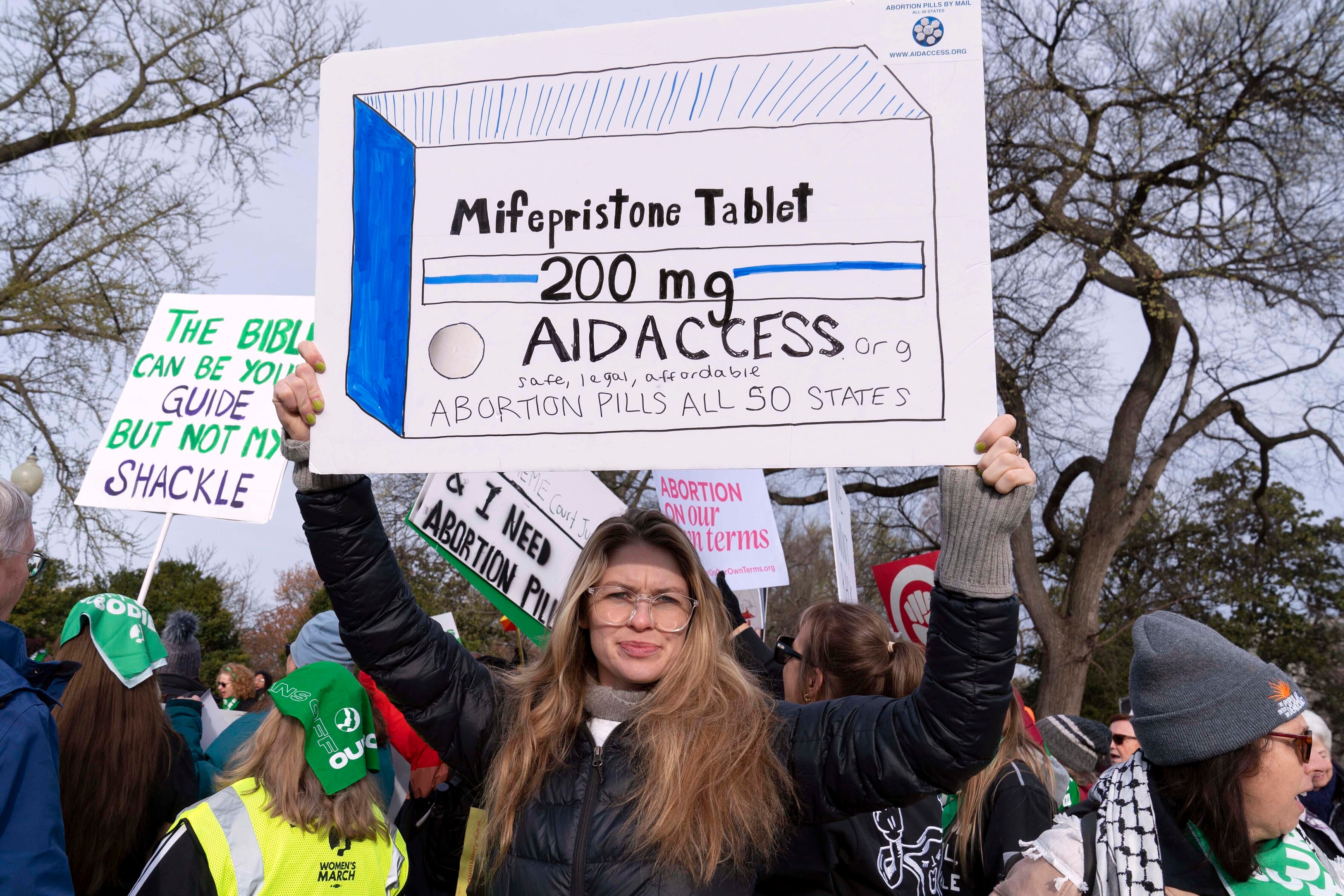Supreme Court throws out challenge to key abortion pill mifepristone
Supreme Court rejected conservative group’s attempt to restrict access to abortion pill medication but left the door open for further lawsuits
A widely used abortion drug will remain on the market after the US Supreme Court tossed a legal challenge from anti-abortion activists.
Justices unanimously rejected arguments from an influential conservative Christian legal group that challenged the federal government’s approval of the drug mifepristone, which is also used to treat miscarriages.
A ruling on Thursday found that the group lacked “standing,” meaning a legal right to sue, but conservatives on the high court left the door open for anti-abortion activists to challenge the drug.
“The plaintiffs have sincere legal, moral, ideological, and policy objections to elective abortion and to FDA’s relaxed regulation of mifepristone,” Justice Kavanaugh wrote for a unanimous court.
But those objections are not enough to “establish a justiciable case or controversy in federal court,” he wrote.
“Here, the plaintiffs have failed to demonstrate that FDA’s relaxed regulatory requirements likely would cause them to suffer an injury in fact,” he added.
Plaintiffs should instead present their objections to Congress or the FDA itself, not the courts, “and they may also express their views about abortion and mifepristone to fellow citizens, including in the political and electoral processes,” Kavanaugh added.
Republican officials in several states are still pushing litigation with the hopes of taking it off the market altogether.

The case marked the first major abortion rights decision at the high court in the wake of its 2022 decision to revoke a constitutional right to care.
Months after that ruling to overturn Roe v Wade, Alliance Defending Freedom filed a federal lawsuit targeting mifepristone from Amarillo, Texas, on behalf of a group of anti-abortion physicians incorporated as the Alliance for Hippocratic Medicine.
US District Judge Matthew Kacsmaryk — who was appointed by Donald Trump — later issued a ruling to suspend the FDA’s approval of the drug, triggering appeals that were kicked up to the nation’s highest court.
The lawsuit argued that the Food and Drug Administration wrongfully approved mifepristone for use up to 10 weeks of pregnancy, and then improperly eliminated requirements that the drug should only be dispensed in person.
In 2021, the FDA under President Joe Biden permanently lifted the in-person requirement for medication abortion prescriptions, allowing patients to access the drugs via telehealth appointments and online pharmacies so patients can take the drugs at home.
In the years that followed, anti-abortion state legislators have filed more than 100 bills to restrict the availability and distribution or abortion drugs, or sought to ban them altogether. After the Supreme Court’s decision in Dobbs v Jackson Women’s Health Organization, more than a dozen states have effectively outlawed all abortions in most circumstances.

“There is no credible dispute about mifepristone’s safety,” said Julia Kaye, senior staff attorney with the ACLU Reproductive Freedom Project.
“When other courts have heard these folks testify, time and again they have discredited them,” she told reporters ahead of the court’s ruling.
Republican attorneys general from several states have latched on to the Amarillo lawsuit, and abortion rights advocates are anticipating “copycat” lawsuits if their challenge fails.
And if elected, Trump could appoint a commissioner to the FDA that could “roll back evidence-based approval of mifepristone” and revoke its approval,” Kaye said.
Trump’s allies also are promoting a plan to invoke the 150-year-old Comstock Act to ban abortion nationwide, without any new action from Congress. Dozens of Republican members of Congress also wrote to the Supreme Court to argue that Comstock should ban abortion drugs.
Their interpretation of Comstock is “entirely wrong, but that is not going to stop these extremists,” Kaye said.
President Joe Biden administration and others have also warned that a Supreme Court decision that targets the FDA’s approval process could open the door for other right-wing-fuelled legal challenges to other drugs, including HIV prevention medication, gender-affirming care, contraception and Covid-19 vaccines.
Thursday’s decision “does not change the fact that the fight for reproductive freedom continues,” Biden said in a statement after the ruling.
Threats to medication abortion “are part of Republican elected officials’ extreme and dangerous agenda to ban abortion nationwide,” he added.
“Women are being turned away from emergency rooms, or forced to go to court to plead for care that their doctor recommended or to travel hundreds of miles for care,” he said. “Doctors and nurses are being threatened with jail time, including life in prison, for providing the health care they have been trained to provide. And contraception and IVF are under attack.”
The ruling is “not a ‘win’ for abortion,” according to Nancy Northup, president of the Center for Reproducrive Rights, which has led challenges to anti-abortion laws and defended abortion access in litigation across the US.
“It just maintains the status quo, which is a dire public health crisis in which 14 states have criminalized abortion.”
Join our commenting forum
Join thought-provoking conversations, follow other Independent readers and see their replies
Comments
Bookmark popover
Removed from bookmarks